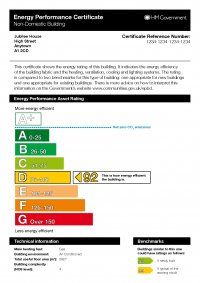EPC in Poole

What is a Commercial EPC and
what
does it mean?
The EPC looks broadly similar to the energy labels now
provided with new cars and many household appliances. Its purpose is to
indicate how energy efficient a building is.
The certificate
will provide an energy rating of the building from A to G, where A is
very efficient and G is the least efficient. The better the rating, the
more energy-efficient the building is, and the lower the fuel bills are
likely to be. The energy performance of the building is shown as a
Carbon Dioxide (CO2) based index.
Each energy rating is based
on the characteristics of the building itself and its services (such as
heating and lighting). Hence this type of rating is known as an asset
rating. The asset ratings will reflect considerations including the age
and condition of the building. It is accompanied by a recommendation
report, which provides recommendations on using the building more
effectively, cost effective improvements to the building and other more
expensive improvements which could enhance the building's energy
performance.
Responsibilities for providing Non Domestic EPCs when selling or letting a non-dwelling
As soon as a building is in the process of being offered
for sale or to let, it is the responsibility of the seller/landlord and
their agent to make available an EPC to prospective buyers free of
charge. (A lease assignment would be considered to be a sale and the
assignor and their agent should ensure an EPC is made
available).
When a building being constructed is physically
complete, it is the responsibility of the person carrying out the
construction to give an EPC and recommendation report to the building
owner and to notify Building Control that this has been done. Building
Control will not issue a certificate of completion until they are
satisfied this has been done.
If a building is modified to
have more or fewer parts than it originally had and the modification
includes the provision or extension of fixed services for heating, air
conditioning or mechanical ventilation (ie those services that condition
the indoor climate for the benefits of the occupants) then an EPC will
be required. When the modifications are physically complete, it is the
responsibility of the person carrying out the modification works to give
an EPC and recommendation report to the building owner and to notify
Building Control that this has been done. Building Control will not
issue a certificate of completion until they are satisfied this has been
done.
Transactions not
considered to be a sale or a let:
The purpose of providing an EPC during the sale or letting process is to enable potential buyers or tenants to consider the energy performance of a building as part of their investment. Not all transactions will be considered to be eligible.
These will include:-
- Lease renewals or extensions
- Compulsory purchase orders
- Sales of shares in a company where buildings remain in company ownership
- Lease surrenders.
There may be other types of transaction that it might be
argued do not require an EPC, for example, living accommodation at a
workplace and tied to a job, or not-for-value transactions, but this
will depend on the individual circumstances of any case.
The
Government's own information about Commercial Energy Performance
Certificates can be found here.
The MINIMUM ENERGY EFFICIENCY STANDARDS (MEES) came in to force on 1st April 2018 see our LATEST NEWS PAGE for full details.

